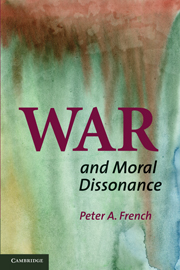Book contents
- Frontmatter
- Contents
- Preface
- 1 The Two-Collar Conflict
- 2 Our Better Angels Have Broken Wings
- 3 Responsibility for Innocence Lost
- 4 Virtuous Responses to Moral Evil
- 5 Assessing Attempts at Moral Originality
- 6 Public and Private Honor, Shame, and the Appraising Audience
- 7 Torture
- 8 Community and Worthwhile Living in Second Life
- 9 Of Merels and Morals
- 10 Inference Gaps in Moral Assessment
- 11 Blaming Whole Populations
- 12 The Moral Challenge of Collective Memories
- 13 Corporate Responsibility and Punishment Redux
- 14 Mission Creep
- Bibliography
- Index
7 - Torture
Published online by Cambridge University Press: 05 June 2012
- Frontmatter
- Contents
- Preface
- 1 The Two-Collar Conflict
- 2 Our Better Angels Have Broken Wings
- 3 Responsibility for Innocence Lost
- 4 Virtuous Responses to Moral Evil
- 5 Assessing Attempts at Moral Originality
- 6 Public and Private Honor, Shame, and the Appraising Audience
- 7 Torture
- 8 Community and Worthwhile Living in Second Life
- 9 Of Merels and Morals
- 10 Inference Gaps in Moral Assessment
- 11 Blaming Whole Populations
- 12 The Moral Challenge of Collective Memories
- 13 Corporate Responsibility and Punishment Redux
- 14 Mission Creep
- Bibliography
- Index
Summary
For the purposes of this Convention, the term “torture” means any act by which severe pain or suffering, whether physical or mental, is intentionally inflicted on a person for such purposes as obtaining from him or a third person information or a confession, punishing him for an act he or a third person has committed or is suspected of having committed, or intimidating or coercing him or a third person, or for any reason based on discrimination of any kind, when such pain or suffering is inflicted by or at the instigation of or with the consent or acquiescence of a public official or other person acting in an official capacity. It does not include pain or suffering arising only from, inherent in or incidental to lawful sanctions.
Article 1: United Nations “Convention Against Torture and Other Cruel, Inhuman or Degrading Treatment or Punishment.”Torturers throughout the centuries may have found some consolation if not positive moral endorsement in what could be described as the scriptural sanction of torture. No higher a moral authority than God does a fair share of it in the Bible. And if God can engage in cruelty, then those who would imitate God may feel justified in using techniques that involve inflicting severe physical and psychological pain and suffering, especially if they are doing so in the service of what they believe to be the right or the good, and despite the United Nations Convention prohibiting such techniques. In the Middle Ages and Renaissance, monarchs and church potentates caused all manner of suffering to be visited on enemies, heretics, and women thought to be practitioners of witchcraft, assuming or citing scriptural endorsement. “Absolute control, cruelty, and torture would be signs of power and godlikeness; they would be evils in everyday life (in, for example, English common law) but good when exercised by legitimate authority.” One of the many things that make the book of Job such a difficult text for moralists must be the cruelty (physical and mental) allowed by and then inflicted by God on a perfectly righteous man, all to win a bet with Satan. Little wonder that many torturers, acting in the name of the state and believing their government's officials sanction their actions, display little compunction about what they are doing to fellow human beings. Some, however, come to realize that when torturing a fellow human being, they have stepped over the threshold into evil, and it weighs heavily on their conscience despite whatever governmental directives may have been concocted to justify torture techniques or what orders they may have been given by superior officers.
Alyssa Peterson (mentioned in Chapter 4), a 27-year-old devout Mormon from Flagstaff, Arizona, for example, served with C Company, 311th Military Intelligence BN, 101st Airborne. She was an Arabic-speaking interrogator, trained at Fort Huachuca, and in September 2003 she was assigned to the prison at Tal Afar airbase in Iraq. After two nights of participating in “the cage” in “enhanced interrogation” techniques that included walling, cigarette burning, punching, and being blindfolded while naked, only to have the blindfolds removed to reveal the presence of women in the cage, Peterson refused to continue interrogations. She committed suicide on September 15, 2003, at the base. One of her fellow interrogators reported that Peterson had trouble keeping her personal feelings out of the exercise of her professional duties. Peterson believed that her participation in torture demeaned her to the point where she could not continue to live with what she had done in the name of serving her country. The torturer as victim of torture!
- Type
- Chapter
- Information
- War and Moral Dissonance , pp. 156 - 176Publisher: Cambridge University PressPrint publication year: 2010



